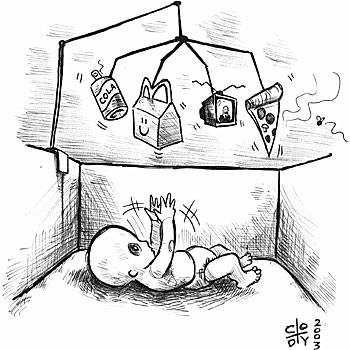
Illustration by Cody Angell
|
By Jessica Lee
Arizona Daily Wildcat
Thursday January 16, 2003
Smashed windows covered in red spray paint. A train tunnel filled with anti-G8 slogans. Happy Meals. Pizza Hut. Starbucks. Kentucky Fried Chicken. Coca-Cola. Nestle. Windows 2000. Jennifer Aniston.
When Americans venture outside the boundaries of a country defined by nightly sitcoms, one-sided news, consumption, political whitewash and stock prices running constantly across the bottom of the screen, many are surprised to arrive in another country and discover that the United States of America had her feet planted there many years before.
Globalization.
Some cringe at the word, others realize the economic and social potential. Both reactions are equally justified.
Globalization is the increasing interconnectedness and flow of capital, cultures, technologies, economic transactions, trade, ideas, languages and people who live in countries that experience heightened levels of global communication.
It could be argued that INDV-103, Globalization and Global Governance, is one of the most important classes taught here at the university. For many students, it is the first class to formally, in an academic atmosphere, open up discussion about the effects of a U.S.-led global financial policy on the rest of the world.
A majority of Americans lack a global perspective due to years of government-endorsed apathy toward international issues in the media. Kids are growing up not memorizing the countries of the planet, nor learning about the Rape of Nanjing, the Basque Liberation movement, the Chilean coup, or the extent of the AIDS epidemic in Africa.
We were encouraged not to aspire to travel the world, but rather pressed to become creative, innovative, capitalism-loving money making machines. Later we would find out that in order to be very successful many would have to turn an blind eye to workers rights, be environmentally careless, and support the corrupt political system that would keep CEOs rich and Wall Street happy.
Joseph E. Stiglitz, winner of the 2001 Nobel Prize for economics, wrote in the first chapter of his book "Globalization and its Discontents:" "Globalization is progress; developing countries must accept it. But to many in the developing world, globalization has not brought the promised economic benefits."
Current globalization, actually the second wave that ignited due to the end of the Cold War, has recently been attacked in the form of intense protests. Many claim that globalization has lost its human face. Although globalization in its ideal state can diffuse peace, democracy, health, education and economic benefits to raise that standard of living for all mankind, the second wave has instead forced economic and governmental policies upon the developing world through the use of International Monetary Fund loans and trade requirements. By pushing countries to rapidly raise interest rates and force financial market liberalization, IMF policies drove many countries into the dirt ¸ spawning social upheaval and instability and lack of attention to environmental protection and local needs.
Stiglitz notes that after World War II, the IMF was "conceived on the recognition that markets often did not work well ¸ that they could result in massive unemployment and might fail to make needed funds available to countries to help them restore their economies. The IMF was founded on the belief that there was a need for collective action on the global level for economic stability."
The IMF is a public institution, established with money provided by taxpayers around the world, but represented by ministries of finance and national central banks. In the 1980s under the Ronald Reagan and Margaret Thatcher dynasties, the IMF found itself overtaken by "champions of market supremacy with ideological fervor." And many argue that the U.S. Treasury, the IMF's largest shareholder and the only one with veto power, has too much power dictating global financial policy. Simply put, whatever is best for American corporations is the best for the world.
As U.S. citizens sacrifice themselves to the "American Dream," much of the third world has been forced into martyrdom. Individual lives are being made worse off. Globalization results in a one-degree separation between members of developed nations and those people who slave away making those products we consume. It's up to us to see it that way.
Stiglitz ends his book, "The developed world needs to do its part to reform the international institutions that govern globalization. We set up these institutions and we need to work to fix them." As students at the UA, you can do your part by becoming an educated global citizen by taking the class "Globalization and Global Governance."

